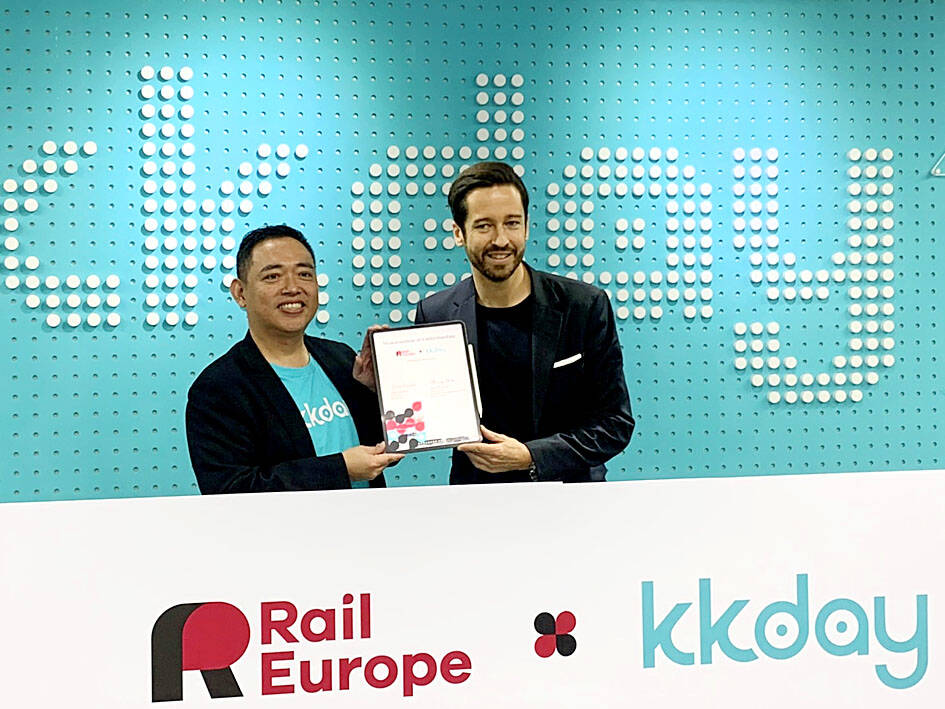Taiwanese e-commerce platform KKday yesterday inked a memorandum of understanding with European train ticket vendor Rail Europe Inc to promote rail travel in Europe.
KKday.com International Co (酷遊天) founder and chief executive officer Ming Chen (陳明明) said that he appreciated the opportunity to work with Rail Europe and he is positive travel growth momentum in Europe would continue next year.
The European travel market had a 60 percent surge in the first nine months of this year from the same period in 2019 before the COVID-19 pandemic, Chen said.

Photo: Ting Yi, Taipei Times
The two sides agreed to focus on product and technology integration, market promotion, passenger experience enhancement and exploration of innovative services.
“The objective of this collaboration is to inspire a deeper exploration of Europe among Asian travelers,” Chen said.
KKday plans to utilize its platform to draw more travel industry partners and enlarge Rail Europe’s customer base, he said.
Rail Europe president and CEO Bjorn Bender said that his visit to Asia has enabled him to gain a better understanding of the region’s diverse markets.
In the post-pandemic era, people have displayed a keen desire to travel and many would opt for train travel to avoid unnecessary flights and help reduce carbon emissions, Bender said.
The company hopes the partnership with KKday would establish an all-in-one platform for travelers and the travel industry that would provide a wide array of products spanning 33 European countries, and more than 150 European rail brands and routes, he said.

CHIP RACE: Three years of overbroad export controls drove foreign competitors to pursue their own AI chips, and ‘cost US taxpayers billions of dollars,’ Nvidia said China has figured out the US strategy for allowing it to buy Nvidia Corp’s H200s and is rejecting the artificial intelligence (AI) chip in favor of domestically developed semiconductors, White House AI adviser David Sacks said, citing news reports. US President Donald Trump on Monday said that he would allow shipments of Nvidia’s H200 chips to China, part of an administration effort backed by Sacks to challenge Chinese tech champions such as Huawei Technologies Co (華為) by bringing US competition to their home market. On Friday, Sacks signaled that he was uncertain about whether that approach would work. “They’re rejecting our chips,” Sacks

NATIONAL SECURITY: Intel’s testing of ACM tools despite US government control ‘highlights egregious gaps in US technology protection policies,’ a former official said Chipmaker Intel Corp has tested chipmaking tools this year from a toolmaker with deep roots in China and two overseas units that were targeted by US sanctions, according to two sources with direct knowledge of the matter. Intel, which fended off calls for its CEO’s resignation from US President Donald Trump in August over his alleged ties to China, got the tools from ACM Research Inc, a Fremont, California-based producer of chipmaking equipment. Two of ACM’s units, based in Shanghai and South Korea, were among a number of firms barred last year from receiving US technology over claims they have

It is challenging to build infrastructure in much of Europe. Constrained budgets and polarized politics tend to undermine long-term projects, forcing officials to react to emergencies rather than plan for the future. Not in Austria. Today, the country is to officially open its Koralmbahn tunnel, the 5.9 billion euro (US$6.9 billion) centerpiece of a groundbreaking new railway that will eventually run from Poland’s Baltic coast to the Adriatic Sea, transforming travel within Austria and positioning the Alpine nation at the forefront of logistics in Europe. “It is Austria’s biggest socio-economic experiment in over a century,” said Eric Kirschner, an economist at Graz-based Joanneum

OPTION: Uber said it could provide higher pay for batch trips, if incentives for batching is not removed entirely, as the latter would force it to pass on the costs to consumers Uber Technologies Inc yesterday warned that proposed restrictions on batching orders and minimum wages could prompt a NT$20 delivery fee increase in Taiwan, as lower efficiency would drive up costs. Uber CEO Dara Khosrowshahi made the remarks yesterday during his visit to Taiwan. He is on a multileg trip to the region, which includes stops in South Korea and Japan. His visit coincided the release last month of the Ministry of Labor’s draft bill on the delivery sector, which aims to safeguard delivery workers’ rights and improve their welfare. The ministry set the minimum pay for local food delivery drivers at